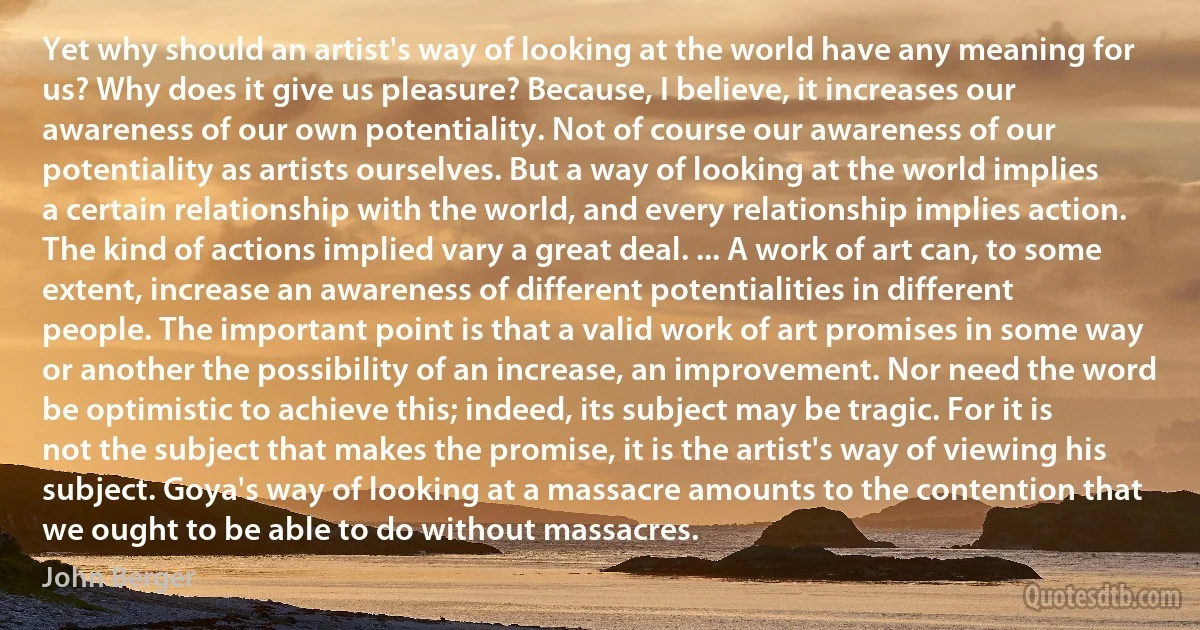
Yet why should an artist's way of looking at the world have any meaning for us? Why does it give us pleasure? Because, I believe, it increases our awareness of our own potentiality. Not of course our awareness of our potentiality as artists ourselves. But a way of looking at the world implies a certain relationship with the world, and every relationship implies action. The kind of actions implied vary a great deal. ... A work of art can, to some extent, increase an awareness of different potentialities in different people. The important point is that a valid work of art promises in some way or another the possibility of an increase, an improvement. Nor need the word be optimistic to achieve this; indeed, its subject may be tragic. For it is not the subject that makes the promise, it is the artist's way of viewing his subject. Goya's way of looking at a massacre amounts to the contention that we ought to be able to do without massacres.
John BergerRelated topics
able action art believe certain course deal different great improvement increase kind looking meaning need nor ought people pleasure point possibility potentiality promise should viewing way word work world yet awarenessRelated quotes
Capitalism subordinates men to machines instead of using machines to liberate men from the burden of mechanical and repetitive work. it subordinates all social activities to the imperatives of an incessant drive for individual enrichment in terms of money, instead of gearing social life to the development of rich individualities and their social relations. The contradiction between use-value and exchange-value, inherent in every commodity, fully unfolds itself in this contradictory nature of capitalist machinery. When capitalism is not overthrown once it has created the material and social preconditions for a classless society of associated producers, this contradiction implies the possibility of a steadily increasing transformation of the forces of production into forces of destruction, in the most literal sense of the word: not only forces of destruction of wealth (crises and wars), of human wealth and human happiness, but also forces of destruction of life tout court.

Ernest Mandel
Nature has placed mankind under the governance of two sovereign masters, pain and pleasure. It is for them alone to point out what we ought to do, as well as to determine what we shall do. On the one hand the standard of right and wrong, on the other the chain of causes and effects, are fastened to their throne. They govern us in all we do, in all we say, in all we think: every effort we can make to throw off our subjection, will serve but to demonstrate and confirm it. In words a man may pretend to abjure their empire: but in reality he will remain subject to it all the while. The principle of utility recognizes this subjection, and assumes it for the foundation of that system, the object of which is to rear the fabric of felicity by the hands of reason and of law. Systems which attempt to question it, deal in sounds instead of sense, in caprice instead of reason, in darkness instead of light.

Jeremy Bentham
In order that woman should reach the same standard as man, she ought, when nearly adult, to be trained to energy and perseverance, and to have her reason and imagination exercised to the highest point; and then she would probably transmit these qualities chiefly to her adult daughters. The whole body of women, however, could not be thus raised, unless during many generations the women who excelled in the above robust virtues were married, and produced offspring in larger numbers than other women. As before remarked with respect to bodily strength, although men do not now fight for the sake of obtaining wives, and this form of selection has passed away, yet they generally have to undergo, during manhood, a severe struggle in order to maintain themselves and their families; and this will tend to keep up or even increase their mental powers, and, as a consequence, the present inequality between the sexes.

Charles Darwin
At the point at which the concept of différance, and the chain attached to it, intervenes, all the conceptual oppositions of metaphysics (signifier/signified; sensible/intelligible; writing/speech; passivity/activity; etc.)- to the extent that they ultimately refer to the presence of something present (for example, in the form of the identity of the subject who is present for all his operations, present beneath every accident or event, self-present in its "living speech," in its enunciations, in the present objects and acts of its language, etc.)- become non pertinent. They all amount, at one moment or another, to a subordination of the movement of différance in favor of the presence of a value or a meaning supposedly antecedent to différance, more original than it, exceeding and governing it in the last analysis. This is still the presence of what we called above the "transcendental signified.

Jacques Derrida
We must make popular government responsible for the betterment both of the individual and of society at large. Let me repeat once more that, while such responsible governmental action is an absolutely necessary thing to achieve our purpose, yet it will be worse than useless if it is not accompanied by a serious effort on the part of the individuals composing the community thus to achieve each for himself a higher standard of individual betterment, not merely material but spiritual and intellectual. In other words, our democracy depends on individual improvement just as much as upon collective effort to achieve our common social improvement. The most serious troubles of the present day are unquestionably due in large part to lack of efficient govern-mental action, and cannot be remedied without such action; but neither can any remedy permanently avail unless back of it stands a high general character of individual citizenship.

Theodore Roosevelt
